|
Photo: Milo To live, what choice, but to do so as we truly are? And if the world fails to welcome us or hounds us and lets us down as members of the human family that we all are, we must find our way through, regardless. The lucky of us may have a gift to transmute our suffering into something durable, artistic vessels that carry us across troubled waters. Or we find our communities where the love is real and you just come as you are, far beyond the cliché of such. To be able to "walk into a room and count on a certain level of acceptance and understanding," as Namoli Brennet says, we can spend what feels like a lifetime searching, clawing, climbing for it. Namoli's music is a testament to the fact that we must live our lives the way we intend, because who we are is not up for debate. Our hearts are pure and the world will do what it has always done, speak too soon, rather than just listen, rather than make room for understanding. Our beating hearts have a language all their own. While a song can transcend so many things, we also don't yet know what a song can do. Can it turn a heart of stone to a heart of flesh? We just don't know. But even if it can't go that far, we hope, at the very least, that it reaches those who need it. I mean, really need it. To make it through the night. "I really think you should hold on a little longer," the songs tell us. These are lighthouses we're talking about. These are lives on the line. In some ways, Namoli says, it all boils down to this; "how can you know if people like you if you don’t show them who you are." To live authentically is to risk so much sometimes, but to live inauthentically is to risk even more. But that we are not alone. Such is Namoli's musical outpouring. Hope songs that leave a trail of light for others in need of emotional mapping back to the world. Yes, you do belong. What choice, but to live your life, to sing your song? *** James Diaz: I know you now call Iowa home, but you used to live in Tucson for quite a while, right? Namoli Brennet: I did, I lived there for 12 years or more. Tucson has a really fertile community of artists working in a lot of different disciplines, and it was a really great place to be. JD: And is Iowa a bit like that too? Namoli: It’s different. I don’t think there’s probably the same sense of community where I live now as there was in Tucson. Tucson had this kind of really unique overlap between the community of artists, the LGBTQ community, and then also sober/addiction stuff. Which makes sense that those would happen together, because of course people would want to self medicate when they’re living in the world as a sensitive person and just dealing with all the baggage that comes from being different. Sometimes it’s nice to have people around you who sort of get it right off the bat. A lot of times, if someone is an artist, they get it, you know? Being a highly sensitive person who takes in a lot of information, is prone to mood swings, and whatever else you’re dealing with, it’s just nice to know that people understand it and that they also empathize with it. JD: To be able to walk into a situation where you have the general feeling that people are going to know where you’re coming from, the places I’ve been and what I’ve experienced. It can often be very difficult to find that. Which is why I wanted to reach out to you because I get that sense from your journey, that it was often a struggle to find that sense of community, and not at all easy. Namoli: It can be hard when it feels like there’s such culture you’re having to push back against. It’s such a difference just being able to walk into a room and being able to count on a certain level of acceptance and understanding, rather than walking through every situation, whether it’s getting gas or groceries, and having to think, “is this safe?” JD: That level of anxiety and high alert, it’s devastating to have to live and walk through that. Namoli: And not even just safe physically, but also psychically. Can I let my guard down, basically. You might not even realize that you’re walking around holding your breath. JD: That makes total sense. The psychic parts of ourselves and our bodies are connected and hardwired into each other. Namoli: And it’s especially difficult when dealing with anxiety, which has always been a struggle for me. JD: And as a performer, the anxiety part must be that much more magnified I’d imagine, to have to go out on stage in front of an audience, how do you work through that part of it? Namoli: I feel like I’ve become a good performer but in a lot of ways I feel like I’m not cut out for it. It’s kind of been this struggle of feeling like I do seem to have a gift for this, but at the same time it doesn’t ever really feel like it comes all that easily to me. Usually once I’m up on stage it’s ok, it’s the before and after and the in-betweens that can be really daunting. JD: I remember something you once said in an interview that really stuck out to me, which was that while you probably still don’t make much more than the average Taco Bell employee, it sure feels like a lot. Is that the part of it for you that allays all the anxiety, the feeling that you get from others telling you that your music has helped them tremendously. Does that part of it become the piece that helps you get up there and perform when sometimes it may feel like the rewards are small? Namoli: Performing is such a weird and unpredictable experience. Sometimes the audience might be big or small, reactive or conservative, so I kind of decided that my goal is to make sure that regardless of those unpredictable environments people have a meaningful experience. Even if there’s only 10 people maybe I can accomplish that. Sometimes not, if people aren’t necessarily open to it. I think I just do it because I never really felt like I had much of a choice. It always felt kind of obvious that I was meant to do my life’s work in music. Although I don’t think I really hit my stride until my 30’s, which has a lot to do with being a transgender woman and going through that process, getting honest with myself about it. I feel like that’s what really opened the door for me creatively. JD: That was kind of the leaping off point for you, making your first album, Boy in A Dress, at a time when you didn’t know for sure if there was a community out there for you. Just saying to yourself; “this is a leap of faith, I know who I am and I have to be who I am and it’s really important for me to tell this story and this is the work I have to do in order to tell it.” And once you got out there you found that there was a community for you, but you didn’t necessarily know it at the time. That takes tremendous courage and has to have been not at all an easy journey. Namoli: I put it off for a long time and I think there was probably a good reason for that. Because I had some idea of what it might ask of me and because I had really bad anxiety all through my mid to late 20’s, and I didn’t know what it was, I just felt really really bad in ways that were hard to describe but super debilitating. That’s when I was thinking about transitioning, it was completely overwhelming because I could barely get through a day as who I was, let alone taking this on. Part of what motivated me was the feeling that part of my anxiety had to do with the fact that I was hiding who I was. I couldn’t walk through the world with any sense of being relaxed and authentic. In some ways it boils down to this; how can you know if people like you if you don’t show them who you are. JD: That’s a beautiful way to put it. And you talked earlier about still having to be hyper vigilant at times, which is heartbreaking, because you had to deal with the anxiety before transitioning of not being able to be in the world as you truly are, and now that you are, you still have this anxiety attached to being who you are because we still haven’t fostered the kinds of communities of care we need in this world. What is your hope around that, from the moment when you began to live in the world as you truly are, to now, the trajectories around your own community and the world at large? Where’s your hope at, do you think we’re better or getting there in any sense? Namoli: Well, I feel better as of January 20th, sure. It was touch and go for a while. I just went through the check out in our grocery store and there was this person who had a button on that said “They/Them/Theirs,” for pronouns. It’s interesting for me to see how the trans experience has evolved over the years. One of my sister’s kids came out as trans, and I told her to let them know they could talk to me if they needed to know anything about hormones or electrolysis and my sister said “yeah, they’re not doing any of that,” and I was like “Oh, I’m like the dinosaur.” They’re more content to just embrace a kind of more ambivalent identity, which I think is really cool. JD: You mean without all the medical process of transitioning, just a kind of mental and emotional reclamation of transition? Namoli: Yeah, and just giving yourself the freedom and latitude to find and explore what feels right. I kind of spent a few years there, in that space. Boy in a Dress being part of that. I wasn’t 100% sure that transitioning medically was necessarily the right thing for me and I kind of evolved into that. In some ways I think it’s getting better. I think it’s still scary also, how quickly things can go backwards. JD: Yeah, we took a lot for granted didn’t we? Namoli: Yeah, we were kind of coasting after Obama and gay marriage. There’s that quote that the moral arc of universe is long but it bends towards justice, so I think we all felt hopeful that these kinds of rights would begin to be extended to other groups and issues and then it was like “wham!” JD: How did this happen, where did we go wrong and how do we do better? I sometimes feel like the answer is so simple, it’s to start listening to each other, but we don’t really know how to do that. Maybe real listening is about mutual vulnerability, to vulnerably dialogue with one another long enough to take in the experience of the other that we don’t yet fully know or understand. Namoli: I have this story that I’ve told a lot of times about when I transitioned. I was working at a church and so I transitioned basically in front of the church, and people got opinions really fast. I was rejected by a lot of people and kind of loathed. Then after a little while we sort of built these bridges, and it made me realize it’s important for me to try and leave room for the understanding of others. Just because someone is Republican or they voted for a certain person doesn’t always mean they won’t sometimes make a genuine attempt to accept you. Although, with Trump, I kind of feel like that went out the window. JD: So do you mean you were able to build bridges with people in that church again later on in life, or around that time? Namoli: It’s kind of a long story, but it came to a head because, within the church, the music we were doing was great, the church was growing because of it, and we were sort of getting along within the music department, but then the larger church body stepped in and decided they could get rid of me because I didn’t share the church's beliefs. So I ended up getting fired because I was trans. But the happy ending of the story is that all these old people who ended up voting for Bush, who were on the board, voted to not fire me, so I kind of felt like we won in an important way. JD: That’s striking and beautiful. I mean, in a lot of ways, it was because they knew you, right? Namoli: Right. I mean the thing is I was directing the choir with all these people who were in their 70’s and I’m still funny and personable, and when you’re making music with people it’s kind of an intimate experience and you trust each other and it’s hard to keep those walls up. When you’re forced to see each other as human beings, then all those clichés and tropes kind of start to feel hollow. JD: That’s a beautiful living example. It’s always easier to hate someone you don't know or haven’t spent any time with. How do we combat toxic cultural attachments, where parents withhold their unconditional love for their children based on sexuality. It’s a big wound for many people, and these things feel like the most difficult things in the world to talk about and fix. I don’t know how we bridge that. If parents put what they think the bible says before embracing their own children, or to just deny that inner instinct to know how alone your child must feel in it. And then on a society level. Namoli: It’s hard to even realize how it impacts some of us because it’s almost in our DNA. Just the sense that it’s natural to be ashamed of who you are. When you absorb that when you’re four or five or six years old it just feels like breathing or something. JD: Naturalized shame, that’s awful. Namoli: That’s a hard one. I didn’t grow up in the worst family experience, but I grew up Catholic and we moved around a lot and I think my parents just weren’t able to really parent, you know? There were five of us and we were just kind of left to our own devices. Sometimes I wonder if you can fix that. That sense of feeling like you don’t matter to the people who are supposed to love you the most. I don’t know that you can go back and change that. JD: There’s a line from your new album that I really love, where you sing that “despite what you’ve been told / the bridges that you burn / they still hold.” Namoli: Did I write that? That’s not too bad. 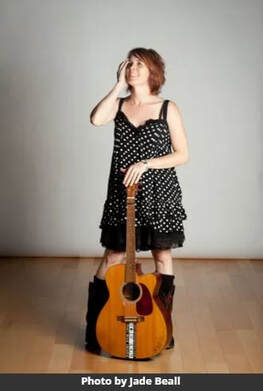
JD: That line sort of sliced through me. We’re talking here about the primal letting down of our parents and can we ever truly repair those bridges. But I guess I’m also thinking of those older people in the church you mentioned, that voted for you to keep your job. It reminded me that it’s never too late or impossible to reexamine an older situation, or to say we’re sorry, that door doesn’t have to be completely closed. Often I’m an all or nothing person, or I’m too in my experience, if I’m in turmoil with someone, to realize that there’s still a bridge there. That struck me as very powerful, the way you put that.
Namoli: I love language for that reason. There are all of these side roads to open up through it. It helps me, in some ways, to try and make some sense of it in the present. Malcolm Gladwell once pointed out how people who struggle with certain things, in this case it was dyslexia, ended up being proportionately more successful because they had to develop a certain skill set to cope with it that ended up being really useful. So I think living in a household where I don’t know what’s going to happen, my parents have a temper, you’re just sort of wary and checking out your environment and pinging it all the time. You know, that’s what I do on stage with an audience, that’s how I read a room. A very similar skill, absorbing facial expressions and body language and the overall feeling of an environment. I think in some ways it helps getting out of being stuck in victimhood, to realize, ok, even though they may not have meant to teach me to be this hyperaware, it has proven useful to me in my life. But then again, I think most people mean well, they simply don’t have the tools to do better. So you have to carry this thing of like; yeah, some less than ideal things happened to me, and I can’t undo that, but maybe the people who did it couldn’t do any better. I wish it didn’t happen though, I’m still traumatized by it. It can take a while to let go of that stuff I think. JD: You talk about reading the room like you would growing up, where you bring your inner child up on stage in a way. But it’s a powerful reclamation too, because you’re making art from your experiences, you’ve survived, and you’re able to draw hope from something that was very painful. Whatever that thing is in our lives that was a hindrance, we’re somehow able to turn it into something nurturing, beautiful and helpful, to ourselves and other people. It sounds like that’s the sweet spot you’ve found as a musician. Not that it’s easy, not that you’re not filled with nights of self doubt, self recrimination, all of that. But that part is kind of the saving grace of the present making good on the past. I heard this beautiful analogy once where someone wrote that a desert tour guide had told him that a cactus will branch out where it’s wounded. His takeaway was that we branch out from where we’re wounded. And something else begins to grow from that that is kind of our saving grace. Namoli: I think I heard a Rupaul interview from a couple of years ago where he was talking about the stuff he went through as a kid and mentioning that it makes you a deeper person. Sometimes when I walk through the world, and I see people who seem to have a really good, easy life, I wonder what it would be like to be that person. To be that beautiful and to kind of have this simple life and a normal family and inherit some money and buy a house or whatever it is normal people do. But then I have to remind myself; “don’t forget that you also have been given extraordinary things.” You might not have this and this and this, but I feel lucky to be able to have the ability to process the world in the way that I do. Just to see it and hear it and let it come through me in whatever form. It’s no small thing to be able to make profound stuff. JD: The pain gives us deeper instinct in knowing about ourselves and others, but we wish it were easier. Namoli: And empathy too. When someone talks about suffering it’s not some esoteric concept. I’m sure we’ve all had the experience of talking to someone about something really hard, whatever it is, and having the feeling that they sympathize but can’t really relate to it, you know? JD: What would you say to young people struggling with their gender identity, struggling with their sexuality, growing up with that feeling in a family of knowing you’re not going to be accepted. What would you say to the younger you or to someone who needs to know that there is some kind of hope out there? Namoli: That’s such a hard question to answer. I feel like I never know how to answer this without saying “hang in there,” don’t give up.” or something like that. This is not answering your question, I’m filibustering here, but I remember one time I was driving, I was moving from Arizona to Connecticut, and driving through, and I stopped at this bar in Texas, and I saw this trans woman across the street at this club, and I was just staring at her. And she probably thought I was staring at her for the wrong reason, but I was staring at her because I was thinking: “how did you do it?” How did you find the courage to tell all these people something that they might not want to hear and to push back against the people who said you weren’t allowed to do this or that it wasn’t ok and that it was something you should be ashamed of? And I think, for me, maybe it was just this idea that you don’t have to have it all figured out to undertake the process, you can just start and let the process teach you. You don’t have to be as brave as you need to be to do it. I don’t know, this sounds a little like a greeting card; “you become brave by doing it.” (Laughter) JD: (Laughter) But you put it in a beautiful way, that you didn’t need to be as brave as you needed to be to do it. You saw someone else doing it, you know what I mean. Sometimes it’s just that other people are doing it and that other people are out there like you and maybe that’s it. You see that there’s someone else and that you’re not alone in it. Namoli: I guess there’s this idea that when you’re going to undertake a risk you need to store up your bravery and then when you feel brave enough, do it. And sometimes you just have to do it and learn to be brave by doing it, I guess. Ooh, that sounded good, didn’t it? (Laughter) JD: It’s like being in the recording studio and going “that’s the take.” Namoli: I know, right. “See, let me tell you what it is, it’s not the number of breaths in your life, it’s the amount of life in your breaths,” or something like that. (Laughter) JD: Laughter is really good medicine. We need both to make sense of ourselves in the world, the serious stuff and the lighter stuff. I’m glad we ended on that note. Namoli: Me too. Visit Namoli Brennet's website for more. Her latest album is Light it Up, and can also be purchased via her website. 3/30/2021 Featured Poet: Bunny Morris emilykneeter CC MY BODY BLED OUT WHILE CUTTING RED PEPPERS I make nothing like love a reduction: ground basil / peach jam / pulped blackberries ground baby won’t you touch me just once more? ground basil / peach jam / pulped blackberries over a seared catfish hip-fucked, up to my pulped blackberry bush I pick and smash and mix my ground basil / peach jam / pulped blackberries and their leaves blackberries and their leave me and / or I’ll cut off my pinky finger CUT I cradle Grace’s big knife and part my finger folds / open red for me / the pepper caves into my / slide slide slide glide / falling in fourths, un afraid of the flesh / afraid of the flesh / afraid of the flesh left ungrown / my translucent skin / organs seeded and left unfilled / you will fill out, you’re just a late bloomer and it takes time my first mother promises / she did not teach me to cook the things that’d fill me / I learned to prepare dinner from my second, third, fourth, and fifth mothers / I learned to fall to the cutting board / learned to prepare myself / to wield something sharper than my hands / keep my nails uncut and never neglect the serrated edge / my women-loves stack their hands, hold their inner palms to my outer knuckles / guide the blade through my purple pinched ridge of skin / reveal the emptying nest of my tendons / my tendons pulled apart like seedling strings / they gather like a dying thing / my pinky finger falls to the cutting board / falling to the cutting board, fingering my core / my off-white core with messy need / with messy knife work CUT I turn seared catfish: squirming beneath / squirming beneath / tasty beneath your tongue / flippering from your tooth-cage / I turn hook -er and beg / swell and grow / my shellfish sick lover / retch and keep me folded in your pocket square / I’ll eat myself so quietly you’ll forget I made you cum to pleasure-tremor come from pleasure-tremor come back from your seizure / I’ll eat myself so quietly you won’t hear a thing as I slice and shave until I find the ectoplasm of a once-woman slipping translucent through my hungry hands CUT NON PERISHABLE FOOD some hungry creature nurses at the cross of my legs. he babbles, yearns from the deep. please, never wake me— let me stay naked forever? half born baby brogues peek from my folds double why chromosomal toes trade spaces follow each step exactly measure teaspoonfulls of boyhood, body-shaped, rounded heap each scoop bubbles then browns— oh fuck, does the cookbook call for salt or testosterone? please, won’t you let me be a pretty boy, the kind that wears rose colored blush? he looks soft and small, should I scoop him with a slotted spoon? can you hear him sleep, snore, and grey? why does he look like each and every man who loves me? become me, become me, become me why won’t he be my batter? why won’t he stand at my back to spread butter, or get stuck between my thumbs— why won’t he possess my blue turned hands to select a grown boy’s button-up to cover my flea breasts? he pulls away from my spoon, my machine and me, we beat and beat and beat and beat my heart to boy heart, why won’t he blend? he separates each toe; as egg yolk, pooled between flour mounds, why must you keep me as woman? LIST OF THINGS THAT TURN ME ON I proposed to myself last night over a glass of champagne. me and my new wife took turns naming kinks. muscle memory. I flung my mouth open: spirals, ropes, forced feminization-- I got wet when she said chronic illness. when she said snuff porn, I pooled in homemade lavender syrup and never turned back. there’s nothing to do but drink: mimosas, apple pie moonshine we fill our tummies round and bouncing. outside, everyone is afraid of bursting at the belly. the world bends to scoop alcohol from the public’s lungs. we watch them press washcloths with their feet to soak up the sick. we gag in our room. gurgle and spit up the same illness over and over. we will teach you how to boil the sick to sweet, even though for you, the ache is only temporary. 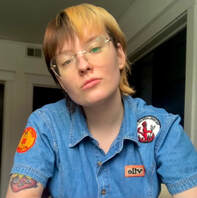 Bunny Morris is a queer poet from Louisville, Kentucky. They are currently pursuing a bachelor’s degree in English with minors in Creative Writing and LGBTQ+ studies at the University of Louisville. Their work revolves around their experiences as a trans sex worker, with a focus on sexuality, gender, and the interaction between trauma and pleasure. 3/30/2021 Poetry by Kara Knickerbocker Randy Heinitz CC Small, Sober In your Southside apartment on the phone with my mom light years away when you pull out the dollar bill, George Washington shrinking, covered in white dust like Colorado mountains you skied, fresh powder & I can see now from the doorway our two worlds colliding, head-on, slickness from your black leather ice sofa & her voice cradled, familiar in my ear. I don’t want her to hear how wrong this feels. I feel small, sober. I feel small sober. We all have our ways out of this oblivion & maybe this is yours, a nasal passageway or vein to a place that doesn’t hurt, & I could tell you maybe I’d kill to be up that high too, or that I think about death at least three times each day but still I’m young to the fear, watching your eyes red & lost, waiting on that universe you can’t create but still try to, would fucking die trying to find-- blaze after Jan Beatty because by now I thought I would’ve found part of me that I love even just enough to stay, or swallow sufficient strength to split open the earth to see its red roots and because I still haven’t, I’m glassy-eyed tired of looking for something rich enough to stem through veins and reach whatever’s left here because breath in the body & a pumping heart doesn’t translate to life and because I’m tired of just barely showing up for mine because not having a reason is reason alone but mostly because I still dream of setting the apartment on fire with me still inside all because I don’t remember what it feels like to burn All the Missing Places I’ve lost her, again and again. My childhood bedroom, rose quilt, don’t wake those floorboards. A summer dress lifted pressed hard against cold chain link across the train tracks on the boardwalk, he laid his shirt down but still there was sand in the fresh cut on my back. In the shower, hands high on the tiled wall, Oh God / wanted to wash me clean again. Upstairs at a frat house, on the attic floor-- didn’t know till I woke alone naked in the dark. Cried the whole way home, wet earth clinging to my heels. Parking lot of a movie theater, hotel when I thought I was in love everything white and pure as linen, as the first snow in December. In a mother’s double wide trailer, she watched us close the door. Far into the woods, in the backseat of that truck I loved so much, a best friend’s spare bedroom, the smell of whiskey and smoke. Propped up on the kitchen counter my eyes on the exit. The bedroom of my first apartment, a father’s couch, the basement of a house I couldn’t map my way back to. Straddling in the water off the shore of a Florida town in front of a picture window overlooking Copenhagen streets, those early hours, regret bending over into the heavy dawn. 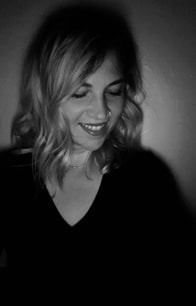 Kara Knickerbocker is the author of the chapbooks The Shedding Before the Swell (dancing girl press, 2018) and Next to Everything that is Breakable (Finishing Line Press, 2017). Her poetry and essays have appeared in or are forthcoming from: Poet Lore, Hobart, Levee Magazine, and more. She currently lives in Pennsylvania and writes with the Madwomen in the Attic at Carlow University. Find her online: www.karaknickerbocker.com. 3/29/2021 Poetry by Pepper Cunningham Abe Bingham CC Equinox at the Dixie Quick Stop I am vomiting breakfast tacos and a decade of shame on the first day of bluebonnet season behind a gas station in Johnson City. From the tinny music piped through the speakers, Willie Nelson advises that the road goes on forever and the party never ends. Party’s over, Willie. I want to throw up my hands and admit defeat. I don’t have the guts. I peel off the sticker on a rotting banana freckled as my exposed shoulders. I need something more on my stomach aside from the Equinox, a milky brew of espresso and horchata now astrally-projectile-vomited in the parking lot. I hold back my hair and inhale exhaust and scattered seeds. I keep everything down but it always sprouts back up. Yesterday’s bourbon and bits of bile mingle on the pavement like old buds running into each other at the bar with nothing much in common anymore except the good ol’ days. 68 miles to go. This expanse of US 290-W stretches and yawns. Wasted peaches squish beneath my boots, shriveled and befuzzed. My phone buzzes in staccato shivers; Mom wants me to shake a leg. Oh no wouldn’t wanna be late to rehab haha eye roll emoji I’m being sent away. I can’t talk. Something’s come up and I need another shot to prove myself wrong. There’s more I need to get out. I shove my fingers down my throat for the last gasp, once more, with feeling, the final shuddering sigh of astronomical winter. I wipe my mouth and pick at a purple thread splitting at the seams of my sundress. I patched it up last week, again, but it’s threatening to unravel, again. Easy Does It Three years and a continent from recovery, I plant myself on the grass, drink two liters of boxed merlot, unlock my phone, and call my baby brother a motherfucker. I wake to tequila sunrises over an empty garden wet with dew and slushpuddles and every bit of scorched earth, every shard of eggshell stuck in my soles. I pick them out one by one. I compost them with coffee grounds and progress, not perfection. I whisper to the dirt I’m sorry, I’m sorry, I’m sorry. 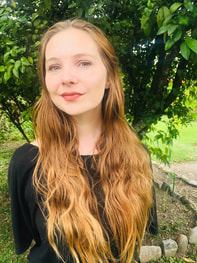 Pepper (she/her) is a writer and teacher who hails from Texas but now calls home the mountains of Vilcabamba, Ecuador. She spends her free time writing by the river, making collages, and marveling at the sheer amount of unrecognizable beetles and butterflies that live in her garden. Pepper is currently the Translation Editor at MAYDAY Magazine. She can be found on Instagram @jonibitchell_ and Twitter @pepwriteswords. 3/29/2021 Poetry by August Bennet Dane CC eventide Night is rustling in your chest cavity, deep, dark winds swirling unrepentant and chilled. You are not alone. Have you ever been truly alone? Night watches you through eyes reflecting like mirrors in the brush. You slap a mosquito against your arm and the insect bursts, red and sticky, warm with your own blood. Night drinks you in, its horns sharp and body misshapen. Can you see the night? Can you smell it? It can smell you. Tell me about oppressive darkness that weighs heavy, wet cloth. Tell me about the sound-- hooves against dirt, a human stance. A shotgun, off in the distance. Tell me about the night and how it swallowed you whole. REFLECTIONS ON THE LAUNDROMAT, 2005 is it possible to cut the red tie between the memory ; the family where light is distorted by time ripples in the fluorescence a pocket for corduroy was spread across my lap that day stuffed bear in the crevice of my arm unsalted almonds clacked against teeth, against floor now, i can almost make out the faintest silhouette of what i once loved stuck to the detergent splatters on the floor my grandmother’s hair curled at the shoulder dyed black, no hint of the gray that permeated the roots my mother beside her, not daring to look each other in the eye two backs facing me warm towels folded with too much force what does it mean to be a grandchild? where can we push the blame? tucked away in a cart pushed against the wall listening, listening fervent whispers that bite, the constant machine rumble of water and cloth the scrape of forgotten metal ; a heartbeat i did not forget my teddy bear at the laundromat that day but i will spend the rest of my life feeling like i had 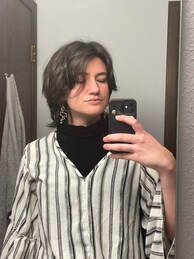 August Bennet is a college student attending the University of Wisconsin-Green Bay, enrolled in the BFA program for Writing & Applied Arts. Currently, they are the editor-in-chief of UW-Green Bay’s undergraduate staffed Journal of Art and Literature, Sheepshead Review. Their work appears in past issues of Sheepshead Review and Northern Lights. 3/29/2021 Poetry by Olivia Williams Sebastian Appelt CC An Alternative to a Battle Cry If you asked me to tell you a story of twenty years, I would start in a tiny isolette--like a hospital bed, but for the impatient the small the not fully-grown. I learned earlier than most what it was like to be broken. I would tell you of two people I love more than anything, who came every single day not to stare, like tourists looking at a tiger in the zoo, But to hope, to summon all of their strength and squeeze each other’s hands as tightly as they could and eat ice cream after in celebration, or melancholy that same sweet treat they’d eat in front of the television every Friday night, that I’d share with my friends as I graduated high school in celebration, or melancholy. I would tell you of how the entire world was in those moments: the first time that baby breathed on her own or every time I make it all the way to work and back without swerving into the opposite lane just because I can just to see what it would feel like. I would tell you that the world is beautiful. I wouldn’t be lying, necessarily, just romanticizing, putting all of the discord and yelling and chaos into an order, that same OCD that makes all of the volumes multiples of five or else the car will crash and you have to wash your left side then your right in the shower because, well, who knows. I’ve never actually messed it up. But something bad. There’s supposed to be a battle cry here, some ingredient we can pluck out of the stars that makes our veins look less like the drunken streets of Boston and more like the strict grids of New York City, something to avoid the tangled words that always sit in my throat, right below my voice box, right where I can’t reach them. There’s supposed to be a battle cry here, but that’s too loud. Maybe it’s more like a whisper. “I’m here, you’re here, and that’s good.” I don’t quite know what’s going on, but I will kiss you through all of it in melancholy and perhaps even in celebration. 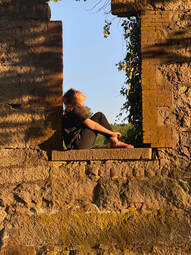 Olivia “Livvy” Williams is, at the time of publication, a sophomore at the University of Vermont. She is double-majoring in English, with a concentration in Creative Writing, and French. She has been writing since she can remember and is the recipient of multiple awards, including Regional Winner of the Patriot’s Pen Essay Contest, Audience Favorite at a poetry contest and Poetry Out Loud class champion. Olivia has attended writing conferences at BreadLoaf and Smith College. Writing is one of the only times the world makes sense. 3/29/2021 Poetry by Katharine Blair Jessica Branstetter CC Moncur Park, 2015 I see you again at a Movie in the Park just off Coxwell. Something about a talking bird. I meet your daughter, her first name the middle of my eldest, and try to bury the sound of it in your mouth. I don’t know yet that you’ll do it again. In two years, a son, without knowing, for the one I’m carrying now. Sometimes the universe tries too hard, I’ll tell myself when I find out. An hour later we’re close enough to touch, our restless littles tucked side by side into swings. Your daughter. My son. Drunk on the lateness of the hour, legs kicking and voices wild. We’re making small talk and I hate it. I used to know your dreams. I miss a question, lost in the afternoon we broke into my father’s house and stole back my things. How we left the Sendak but pushed our luck to find pictures of my sisters. I want to tell you I still have them. The pictures and the sisters. I want to tell you that some people fight for the things they love. I love the beard. I want to say that too, but we’re too careful at this distance. Twenty years and four kids between us and I miss your hands, the warmth of your father’s pipe, your sister who was kind to me in ways it took me years to understand. I want to say I’m sorry for dragging you into it. Into me. I want to tell you I didn’t get any warning either. The way I remember that night there was you and the loft bed and the hash we got from Tim, our standard coke bottle bong, hole melted through with one of the Marlboros you...do you still? No, wait. Nevermind. I’m getting lost again. My father at the door. Your mother, calm as ever. Your name, then mine, then the cold slap of January. Daddy’s voice, false and full of concern then flat and even as he made the pivot from embarrassment to anger. His hair, those big angelic curls, all aglow in the light of the gas station parking lot where he set his terms and I walked away. The second and last woman to ever say no to him. My father, defeated and confused, on the street outside my mothers house. And me. Stepping inside. Still thinking about you. Your kid is eating sand when I come to. Mine looking on, wide eyed and full of ideas. It’s clear we’ve been talking but I’ve got no idea what’s been said. Both kids need bed but I can't bring myself to leave so I suggest a game. You turn to face me and all of a sudden I want to tell you your wife is too pretty for you but it won’t come out right, and anyway. Tangents again. I always did get muddled up when we were this close. I know I wasn’t the same after. I can see that from here. He let me go so easily and I just needed to know you wouldn’t do that too. I want to say I’m grateful. For the love and the letting me stay and for the leaving too. I was a mess and you were a child and I know that now. I know that it was me that made all of it happen. Losing him. Losing you. I want to say I forgive you now and I forgive me too. That there is no way to see your life clearly while you’re still living it. I want to say you had, have, beautiful hands. Big and rough, and strong for me before I knew I could be that too. Instead I say, ‘I’m so glad you’re happy’. And you answer, I think. The movie ends and your daughter is calling and I let you go again. 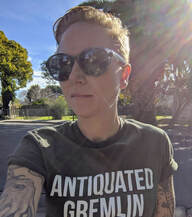 Katharine Blair is a poet, writer, and aspiring hermit currently based in California. Grateful to have entered her invisible years, Katharine is most interested in the intersections of childhood trauma, personal understandings of identity, and mental health. 3/29/2021 Poetry by Alexa Doran nick furs CC Dear Casey Kasem. I haven’t seen a pear gash since. my son gasped. to life on the lanai. since flesh became mirror. I no longer need. a juice revealed. a life halved. Yet I feel. as if the world has forgotten how to trickle. has lost. the art of eking out. The 2 PM sun is joining us. It’s mad. it traded fucking for photosynthesis. I thought you would know. what to do. You are so good at choosing. Mr. Kasem, I bend. the night like others bend a spoon. I grovel. I want. numbers to be real. the way fruit is real. by rotting. I want proof. I am 22. Yes say. Number 39 like it’s the gold. shellac of a lifeline. Dangle that shit. like Mariah dangles the high notes on her chart hits. Make the sun feel. the grace of osmosis. Join me. just this once. let my son feel. the wisp of radio static. save him. from a world hell. bent on measuring everything. in moss. sized increments. Nothing but the forest. to map ourselves. against. Dear Casey Kasem. I approach not. as clouds but as cumulate. as flash of igneous. You will laugh. when I say lava made me like this. You will not think. shot through. not imagine hollowed out. I don’t need a fucking. therapist. I need a voice. lonely and whiskied. to slalom the distance. to log rain-fat hours in the cider scent. of my kitchen. You never have to leave. the studio. I am willing to be loved. via microphone. Touch is so. overblown when what. enters the ear enters the soul. Closer to the brain they say. I will find node after node. twitching and delicate. as sherbet whole roads. which will lead to the child I left. at the beach where those boys ate my virginity. Their eyes aisles to every hole.  Alexa Doran is currently working on her PhD in Poetry at Florida State University. Her full-length collection DM Me, Mother Darling won the 2020 May Sarton Poetry Prize and will be published by Bauhan Publishing in Spring 2021. She is also the author of the chapbook Nightsink, Faucet Me a Lullaby (Bottlecap Press 2019). You can look for work from Doran in recent or upcoming issues of Passages North, Literary Mama, Pithead Chapel, THE BOILER, and Harvard Review, among others. For a full list of her publications, awards, and interviews please visit her website at alexadoran.com. 3/29/2021 Poetry by Nicks Walker Torsten Behrens CC All The Way Down I am nothing I am my hands I am my mouth I am being raped I am the collision of bodies and dark-white behind eyes I am only existent in this precise moment I only exist in this precise moment I only exist in this exact moment I can only exist in this precise moment The person who wrote the last four lines is dead now The person writing this line is around 10 seconds closer to dying, now The person who wrote the line above is dead The person who will write the line below doesn’t exist yet I am concentrating on my toes I am copying a poet I like more than myself I am not sure if my being is separate from what I do I am not sure if what I do can be separated from my being I only like words about me that are verbs I don’t enjoy the word me I do sometimes enjoy the word you I cannot deny that someone has read these words before you I am agnostic on the issue of my existence I hope you can understand I cannot even remember if I called you Sir or Master I was a machine for keeping her alive A shop run with mold hands Toy thrown out the pram Pulled back in, and thrown Part girl, post-lesbian Not enough of a man To scare her enough And you were an academic lens With a scalpel I lay down on your slide Let you capture one long thin slice of me To keep in a swollen wooden drawer In the geology department And devour Disgorge And devour How many times could we mash The same body-scream into our phones? I will hurt you I will penetrate you I will be penetrated I will do things for you Do this thing for me I have done it I will penetrate you Come over Come over Come over I will come It was rude of you to rape me It felt rude of you I walked backwards Into you Looking at her Trust-drunk And already so far outside my body Eye-Movement Desensitization and Reprocessing “It’s the first day of this festival, Well, it was the first day It had been the first day, the day before And I haven’t gone to bed at all I’ve been up all night With a smaller and smaller group of people Filtering off to get some sleep I’d just arrived with this mate - Now one of my best mates, my best mate - In his car, with the sound system in a trailer These naked people ran up to the car To give us beers through the window Except we’d slid halfway down this hill So I jumped out And it all becomes a bit of a blur, but, right - It was the first day And the sun was coming up again And I’d just walked this other friend of mine home And we’d been making out, up against this giant cube Some piece of interactive installation art We’d been solving it, and then, just - I’d followed them back for no proper reason Held their hand on the way up there And yeah, the sun’s coming up And I’m stood at the top of this hill And the grass is really wet but it’s already hot Maybe 6am And I know I’m about to just Run down this hill I’m going to leg it full on like I used to do every day Down the garden on my walk home from school That big shared backies between all the houses Like those little narrow council house gardens? But someone took all the walls away I used to run down it so hard and It was the best part of the day Like this special little second where I could imagine anything If I could fit it in while I was running So I’m about to run down this hill Towards the lake And the sun’s coming up And I’m so - I think I know it’s the best day of my life, you know? I just know it and that’s okay It’s wonderful. So yeah, that’s the memory I want to use.” 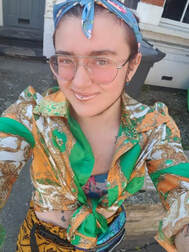 Nicks Walker is Scottish poet and queer trans man, currently locked down on the Southern English coast. A small witch of his appears in The Speculative Book 2021 ("Her Over There"), and you can find his work on grief and furbies in Qmunicate Magazine ("This is the whole story of The Furbies"). He has four rats and autism and tweets @nickserobus 3/29/2021 Poetry by Nico Lorraine Torsten Behrens CC I show up to therapy with my mother, And she is already there waiting for me, a surprise since she’s never been on time a day in her life. the therapist welcomes us in, but there is only one chair for us to sit, and the therapist asks if I want to sit on my mother’s lap, but I know her touch is poison; I know she has mixed just the right dosage for me. Mother cries she moved to Canada to give me a better life, I look around and ask where is it then? The therapist says I need to appreciate my mother’s sacrifices. Mother lights a cigarette, I ask why she lied about always being a smoker throughout my childhood, she’s shocked, hurt, she’s never smoked a day in her life; the therapist applauds her good life choices, Leans over to light another cigarette hanging from my mother’s mouth. I empty her purse and there’s nothing but nicotine patches and gum. My mother holds up old used wax strips, laughs that my hairlessness is a myth. I say she took me to my first appointment so I could stop looking like a man, she swallows them whole, says I remind her of my father. I tell the therapist how she sped into oncoming traffic screaming I’ll be the death of her and damned if she doesn’t take me with her; my mother cries, says I made her do this, says if I had been a better child none of this would have happened. My sister walks in, both of us eye her, plead for her to take our side, tell the truth about the other. she opens her mouth, but before any words come out, her tongue severs itself free and flies out the window, faster than any of us can catch. She goes to the corner and cries. I tell the therapist mother loved me best in black and blue, throwing tv remotes until my eyes blackened under her love. Mother sits like an angel, a halo of smoky innocence around her, says we never even owned a tv. Mother vomits up poker chips and the therapist wheels in a blackjack table, starts dealing cards, says childhood trauma is the buy in. mother says since I blame her for everything, I owe her my buy in, reaches into my throat to find my share. Her stack of chips is taller than her four feet ten inches, she keeps tapping for another hit, says she’s never played before, how exhilarating as she pulls another stack of chips closer to her, building a castle of safety around her; but I know it’s only one wrong hit away from tumbling down. The therapist keeps repeating my issues with my mother could be solved if I just forgave myself and offers me lavender oil to keep calm and destress, I turn into a meadow meant only for my mother to trample, the therapist anoints me in lavender again. It’s the end of the hour, mother says she can’t pay, asks to borrow a twenty, a fifty; she turns it into pennies, hoping to hit the jackpot with the next one.  Nico Lorraine is a queer latinx living in beautiful British Columbia with their cat. They find inspiration in the mountains and the forests, and writes poetry to remember and to relive. |
AuthorWrite something about yourself. No need to be fancy, just an overview. Archives
April 2024
Categories |


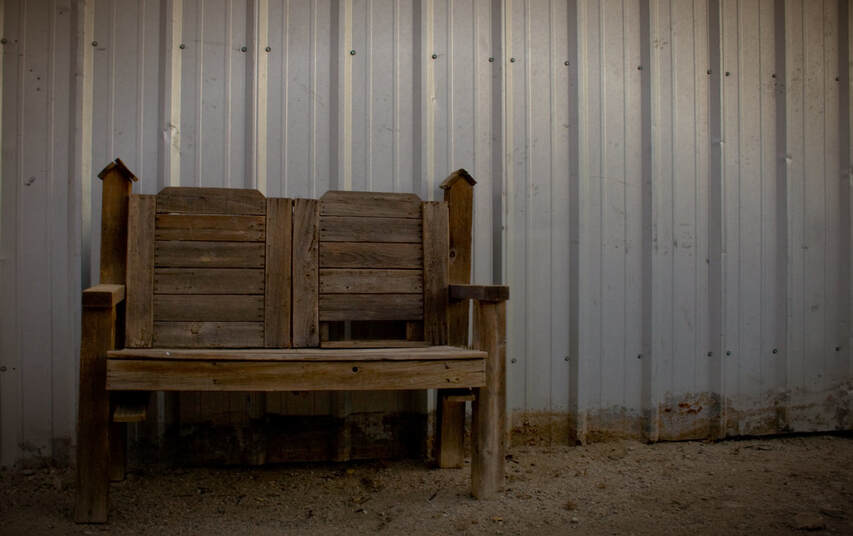
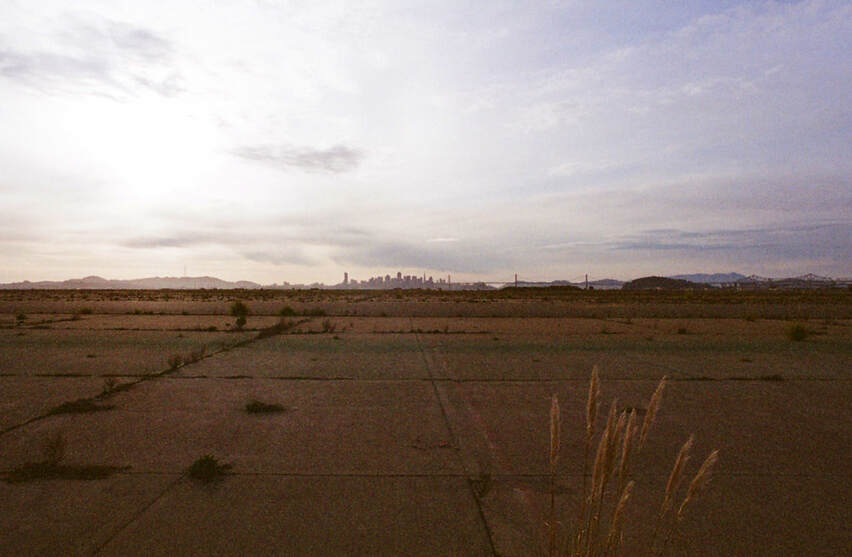
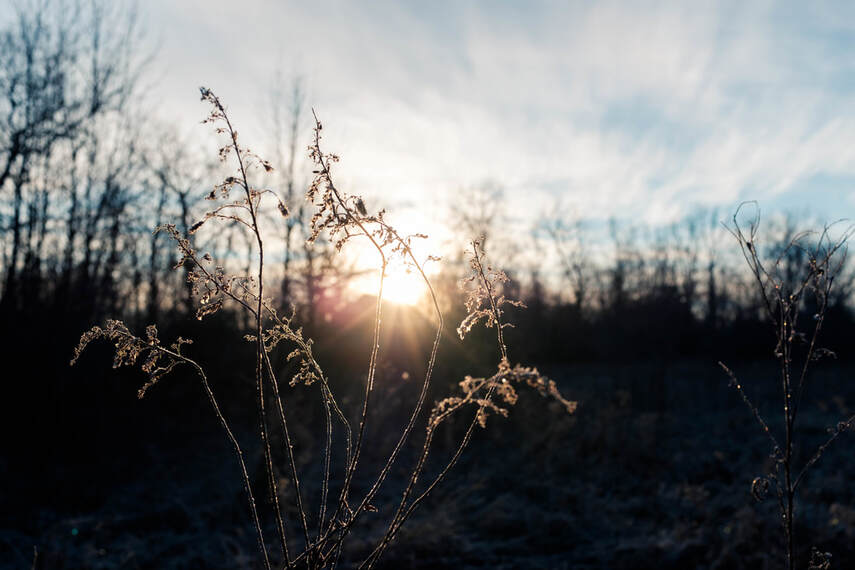
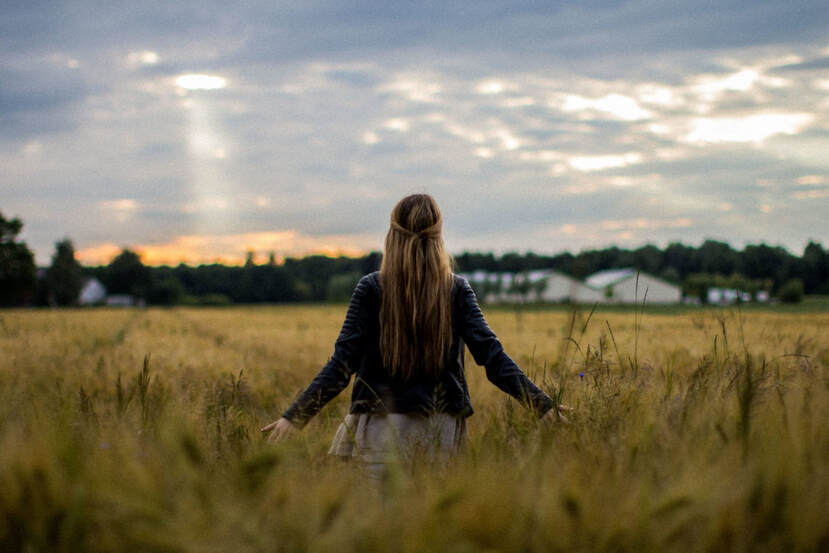
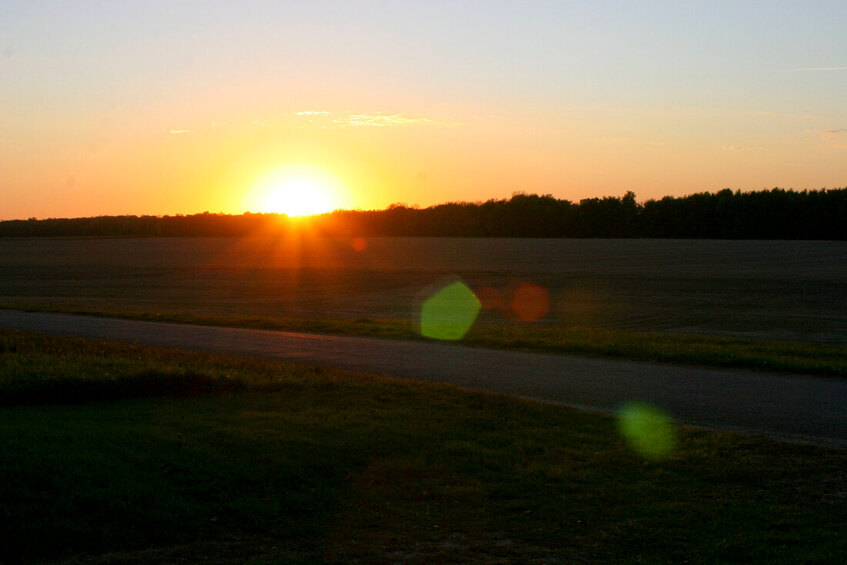
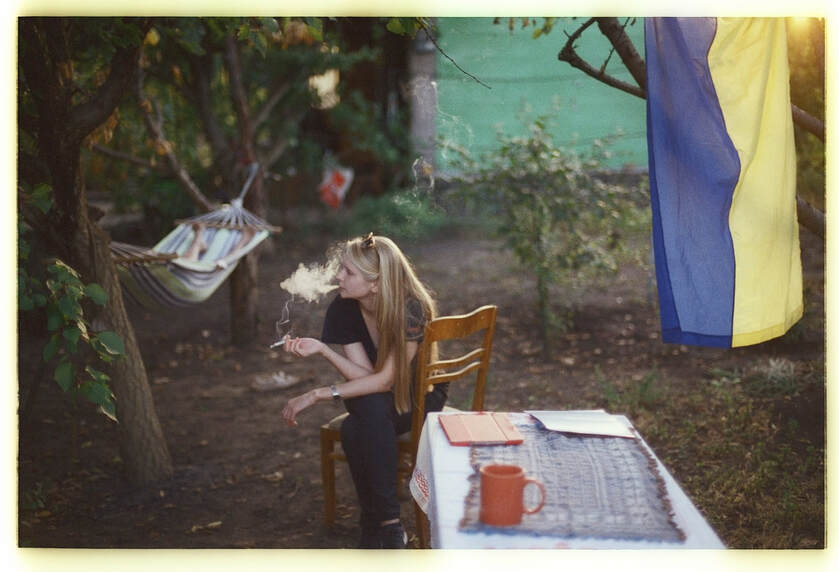
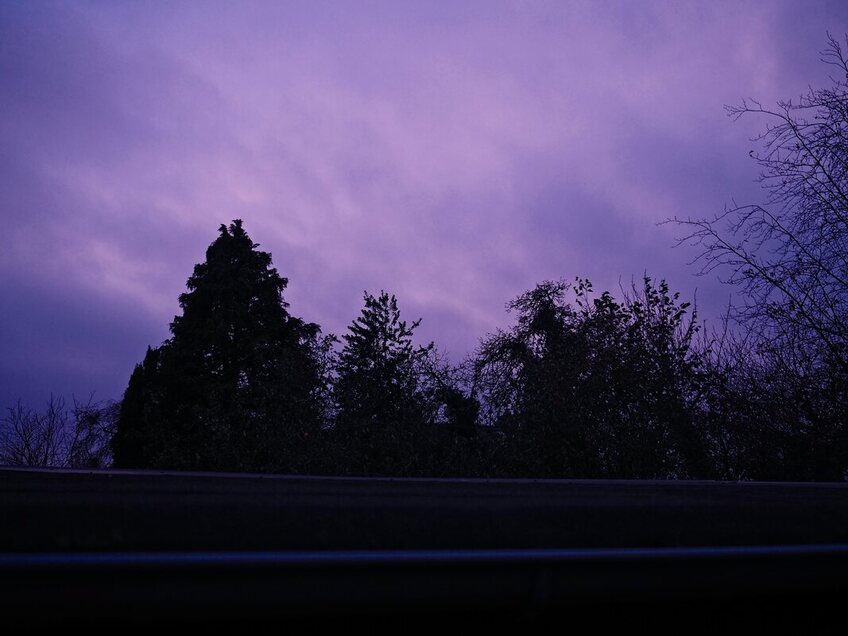

 RSS Feed
RSS Feed
